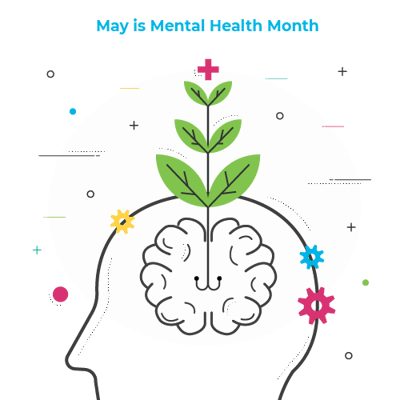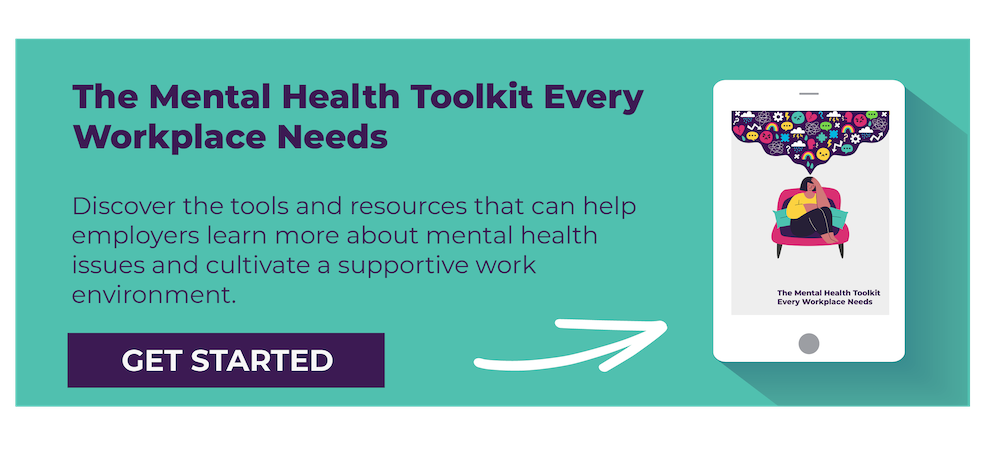 May is Mental Health Month.
May is Mental Health Month.
Given the current worldwide situation, there’s no better time for employers to focus on the importance of employees’ mental health. Across the country, crisis hotlines are seeing a spike of incoming calls from individuals struggling with mental health concerns.
Mental health issues especially triggered by the COVID-19 pandemic include:
- Anxiety
- Depression
- Obsessions
- Traumatic stress
Psychologically, stress can cause digestive issues, headaches, sleep disturbances, and more. Not exactly the best conditions for your employees to do their best work.
If you’re interested in learning how to provide support and educate your employees about mental illness, Mental Health Month is the ideal time.
Read on for mental illness facts, the best resources to share, and COVID-19’s effect on mental health.
The COVID-19 Impact on Mental Illness Spikes
While the newest studies fluctuate as new information trickles in, there’s no doubt that Coronavirus is stressful. From unexpected layoffs to heightened anxiety about avoiding public places, research shows that individuals everywhere are mentally on edge.
Preliminary research shows it’s having an impact on anxiety levels:
- 6% of Chinese citizens surveyed experienced Coronavirus-related anxiety
- 48% of Americans are anxious about potentially contracting COVID-19
- 62% of Americans are anxious about loved ones getting Coronavirus
For those already dealing with mental illness, Coronavirus has likely amplified emotions and set off triggers. That’s why connecting employees with the right resources, offering support, and encouraging self-care during Mental Health Month is essential this year.
According to the Centers for Disease Control and Prevention (CDC), excessive stress during pandemics can cause a lot of physical and emotional challenges for individuals including:
- Difficulty sleeping
- Challenges with concentrating
- Changes in eating habits
- Worsening of chronic health issues
- Worsening of mental health conditions
- Fear about the health of self and others
- Increased use of alcohol, tobacco, or drugs
It’s important to note everyone reacts to stressful situations differently. Sharing resources and expert advice from mental health professionals can give your employees insight into how to best handle mental health struggles.
Mental Health Issues Increase During Stressful Times
Mental illness and mental disorders are a wide range of conditions that impact mood, thinking, and behavior.
And during times of extreme stress, these illnesses can be exacerbated.
These are typically not the result of one event — like a pandemic, for example — but genetics, environment, and lifestyle all play a part in its development. It’s noted by mental health experts that stressful situations and traumatic life events can make people more susceptible to being triggered into a mental illness episode.
It’s important to check-in on employees to see how they’re doing, but especially any who have a history of mental illness issues.
Why Employers Should Observe Mental Health Month
Right now, experiencing stress and anxiety about the current public health situation is a natural response, according to psychologists.
Coronavirus has touched every part of our society. Not only has it shut down entire parts of the country, but it’s also challenged our very nature as humans to be social.
In the age where remote work is the new normal, it’s important to check-in on employees to see how they’re doing. Mental Health Month is the perfect reason to do so and bring up mental health facts and resources.
Anxiety, loneliness, and isolation can all be triggers for mental health issues.
Current events can also trigger OCD — especially when it comes to cleanliness — and even cause a flare of traumatic stress. Nearly 29% of people who were quarantined during SARS in 2003 are dealing with traumatic stress right now, according to a study from the medical journal The Lancet.
As an employer, consider using Mental Health Month as an opportunity. It’s a chance to acknowledge and recognize potential distress, helping employees to feel supported in their role and life.
Since 1949, Mental Health America and its partners have reached millions during their observance of Mental Health Month as a way to educate on mental illness.
Click here to download the 2020 Mental Health Month toolkit.
Mental Illness by the Numbers
During Mental Health Month, share as much as you can with your staff about local mental health resources. Given the ever-changing climate of what resources are available and open, be sure to give out information about any telemedicine mental health services, too.
These numbers paint a convincing argument for the need of accessible mental healthcare:
- One in five U.S. adults has a mental illness
- One in 25 U.S. adults experiences serious mental illness
- 50% of all lifetime mental illness starts by age 14
- One out of every eight ER visits involves mental illness
- Suicide is the 10th leading cause in the United States
Now may also be the time to have a healthcare insurance/benefits meeting to remind employees of any mental health services they have access to through your company. If mental health isn’t covered by your company’s health insurance provider, consider seeing what the extra cost would be for it.
Mental Illness Facts to Share
Spreading awareness through mental illness facts is the best way to educate your staff.
They may not have a name for the emotions and behaviors they’ve been experiencing. Given that the average delay between symptoms and treatment is 11 years, the information you give them could be a positive game-changer for their life. Resources that offer science-backed research from experts is best.
Consider sharing information from:
- Mental Health for America
- National Alliance on Mental Health (NAMI)
- Anxiety and Depression Association of America
By simply sharing information, you give employees the opportunity to better understand mental health issues — for themselves and others.
Mental illnesses includes but isn’t limited to:
- ADHD
- OCD
- PTSD
- Depression
- Psychosis
- Eating disorders
- Schizophrenia
- Bipolar disorder
- Anxiety disorders
Additionally, here are mental illness facts to share on some of the most common issues:
Fact #1: Anxiety disorders are common
Of all the mental illnesses in the United States, anxiety disorders are the most common. It impacts 40 million Americans each year, according to the Anxiety and Depression Association of America website. While the condition is highly treatable, only about 36.9% of individuals get treatment. While most people experience anxiety at some point, it’s problematic when experiencing a persistent, excessive fear.
Fact #2: Depression and disability go hand-in-hand
Depression is the leading cause of disability in the world, according to the National Alliance on Mental Illness (NAMI). It can also lead to suicide if severe and left untreated. More than 264 million people worldwide have depression.
Fact #3: Long-term anxiety can cause physical health issues
When the body is always in flight mode, anxiety can cause behavioral changes and physical health problems. Chronic anxiety can disrupt the immune, digestive, cardiovascular, and reproductive systems.
Fact #4: Anxiety looks different for everyone
For those with chronic anxiety, the symptoms are different person-to-person, according to Mental Health UK. While some people may primarily experience digestive symptoms or headaches, others may have sleeplessness, or feel sadness, anger, or irritability.
Fact #5: OCD may be genetic
Obsessive-Compulsive Disorder (OCD) risk may be higher for people with first-degree related who have it — like a parent or sibling. If the relative developed it as a child or teen, the risk is also higher of it being passed along genetically.
Fact #6: PTSD triggers can happen without warning
Some individuals with Posttraumatic Stress Disorder (PTSD) know particular triggers will set them off — like yelling or loud noises, for example. Other triggers, however, can be less clear. It may appear like the PTSD flashback happened without warning or cause.
Help Employees Cope With the COVID-19 Crisis
Everyone deals with stressful situations in their own way. But it’s an important life skill to learn how to handle those overwhelming times in a healthy way. Currently, our entire world is experiencing a unique challenge with social distancing requirements, stay-in-place orders, and a new illness.
Focusing on positive ways to cope is helpful for now — and future personal and global events — that may feel out of hand.
Here are some helpful resources and tips to share with employees:
- Limit your news sources and consumption - Think about limiting how often you check the news. Don’t jump to conclusions, but instead, rely on facts. The Centers for Disease Control and Prevention (CDC) is a good source.
- Speak with a professional - If you’re concerned about your mental health, talk to your health care provider about your specific needs. They may suggest counseling or medicine, if needed.
- Make self-care a priority - Do your best to actively find ways to reduce stress. That may mean learning to meditate, journal, exercise, etc.
- Find positive distractions - Focus on helping others and finding distractions that give you a sense of purpose. Take care of things you’ve been putting off like spring cleaning or organizing. Tasks that make you feel good when you’re done are the most productive.
- Stay connected - Continuing staying in touch with family, co-workers, and friends via video technology. Try listening more than you talk and focus on the positives of your current situation.
- Know help is available - Don’t be afraid to reach out for help. The National Alliance on Mental Illness (NAMI) Slogan for 2020 Mental Health Month is You Are Not Alone. Repeat that to yourself often.
Additional mental health resources that may be helpful to you or your employees during the COVID-19 crisis:
- Disaster Distress Helpline: Call 1-800-985-5990 or text TalkWithUs to 66746
- National Suicide Prevention Lifeline: Call 800-273-8255 or chat
- Crisis Text Line: Text TALK to 741741
- Veterans Crisis Line: Call 800-273-8255 or text 838255
Want to help your employees during Mental Health Month? Check out our post: 6 Ways to Encourage Employees to Focus on Their Mental Health.
Mental health image design: Created by Freepik



